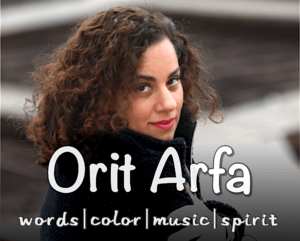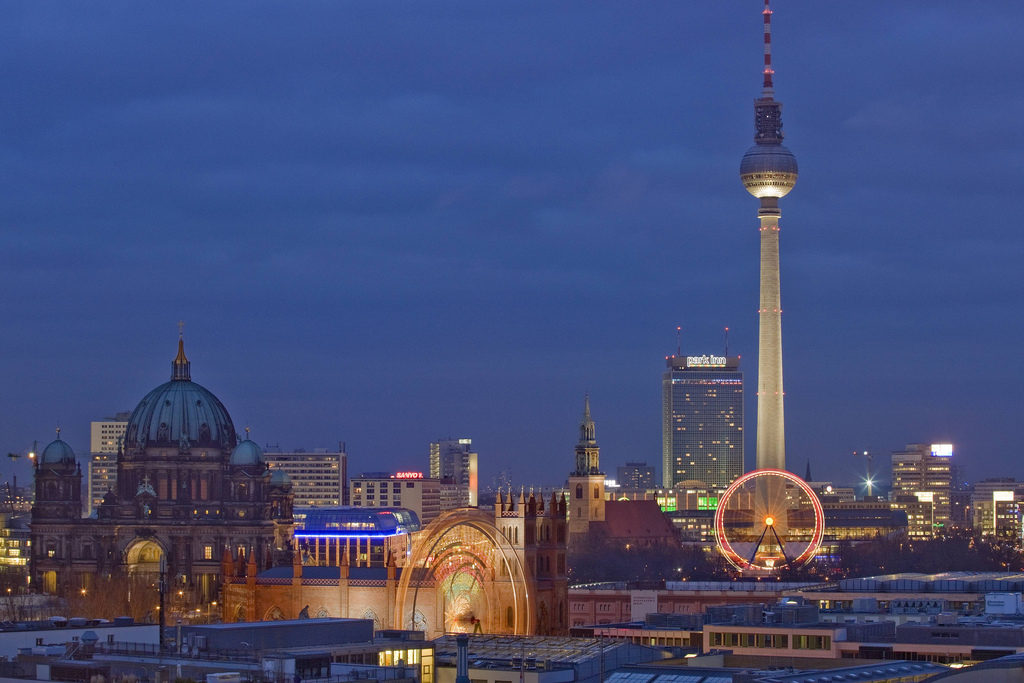Jerusalem Post Magazine, Dec. 23, 2016
Read the original online here (for Jpost subscribers)
Check out the print version with pix, here
A few weeks ago, a long time before the latest brutal attack in Berlin, the Cohen family from Tel Aviv installed a Hanukka tree for the very first time.
Having relocated to the German capital about four months ago for work, Gabi Cohen and his wife, Or, decided this year they would engage in a practice they know to be more common in the United States, where it’s known as the Hanukka “bush.”
With the display of lights turning the famous, ritzy boulevard Kurfürstendamm, a.k.a. Ku’Damm, near their apartment into an urban winter wonderland, they didn’t want to risk a case of Christmas envy among their two- and five-year-olds, especially as this year the first night of Hanukka and Christmas Eve fall on the same day.
“It’s only to give them the opportunity to be able to talk about the tree, but with a more Jewish perspective of Hanukka and not the Christian perspective,” Gabi told the Magazine earlier this month.
“The tree is a Christian symbol and we are fully aware of that, but we keep the Jewish perspective very tight.”
The Cohen family’s evergreen, the size of a small bush, was just about complete in the corner. Instead of Christian ornaments, they put decorative oil pitchers, commemorating the “kad” of oil that lit the Temple menorah for eight days once the Maccabees defeated the Seleucid Greeks. Their children would hang the Star of David at the top. They recently attended a kumzitz (bonfire in Hebrew slang) at their children’s Jewish “Sunday school,” but a week before Hanukka, they decided to skip town for the holiday weekend and take the children skiing.
Or, an educational specialist with German Jewish roots, has taken the convergence of Christmas and Hanukka as an opportunity for a cultural exchange at their son’s international pre-school in the Mitte district. She was invited to the classroom to teach about Jewish traditions. Gabi returned from a recent visit to Israel with dozens of dreidels and hanukkiot in tow for a school art project.
BUT THESE Hanukka ritual objects actually have their German counterparts, pointing to a cultural interchange dating back centuries when Jews lived in Germanic lands.
“Christmukka” in the United States suggests the merging of two diametrically opposed holidays – one Christian, one Jewish. In Germany, however, Christmas is referred to as Weihnachten, in which “Weih” mean “to consecrate” the root of the word Hanukka (lahnoch).
Nadav and Tamar Gablinger, an Israeli husband-wife team who moved to Berlin in 2001 and who now run tours of Berlin, explain to Israeli tourists the Weihnachten-Hanukka similarities during their seasonal tours of the city’s popular Christmas markets (“Weihnachtsmärkte”), a festive national affair that begins during Advent, the four weeks counting down to Christmas.
“A lot of things that we associate with Christmas are sort of deriving from German culture and by proxy American culture,” said Tamar, who holds a doctorate in sociology of religion from Berlin’s Humboldt University.
She noted that American Christmas traditions were imported initially by settlers from English-speaking countries.
“But the heaviest influence of what we know from Christmas traditions in the United States, and copied all over the world, is German tradition.”
The dreidel likely is related to a German spin-top gambling game. In some streets in Germany, you can see Stars of David lighting the streets – not a nod to Hanukka, but to the Star of Bethlehem, any type of star, really, that signifies the nativity. Some German communities, particularly mining towns literally yearning for light, feature in their windows a “Schwibbogen,” a bow-shaped candelabra.
“When I was little, I was always told that one of the big ‘no-no’s’ about a kosher hanukkia is that all of the candles are supposed to be on the same line. I’m not really sure when this big ban on unequal candles developed.” She surmises the halachic “ban” evolved in the last few centuries to differentiate between Jewish and non-Jewish candelabras.
“It’s difficult to say what was first,” Tamar said about the similar customs, which include, of course, food. At any one of the bright markets all over the country, one could order latkes, fried potato pancakes, known in German as Kartoffelpuffer. The sufganiya – jelly doughnut – has its German counterpart in the Berliner. Tamar also relates Lebkuchen, a type of German gingerbread cookie, to the duvshaniya – a spiced Rosh Hashana sugar cookie.
But the Gablingers don’t take these similarities as license to celebrate “Weihnnukka” with Christmas themes.
“[Christmas] is not my holiday, but we make a big deal about Hanukka,” said Nadav, Tamar’s husband. “Hanukka was not that of a big deal for us in Israel, but Hanukka is not something really big there.”
“To keep my children from asking why we don’t have a Christmas tree and why all the other children get gifts and we don’t, the children light the fire, and we make a big thing of each one lighting their own hanukkia. They get gifts for Hanukka.”
This “Weinnukka,” they plan to observe their homemade tradition of eating and hanging out in Berlin’s Vietnamese market, the equivalent of American Jews’ tradition of eating Chinese.
The Cohens and Gablingers noted that singles and or couples without children are usually less concerned with balancing Hanukka and Christmas. They could enjoy the festivities as the anti-depressants against the winter chill that they have become to non-religious Germans. The religiosity of Christmas varies from city to city, but in secular Berlin, the holiday has taken on a cultural, commercial tone, an excuse for drinking that holiday treat, Glühwein (mulled wine).
In East Berlin, the holiday was de- Christanized altogether. In fact, the Gablingers noted that Christmas has its roots as a pagan festival marking the onset of winter.
FIVE YEARS AGO Nirit Bialer, a business development consultant, and Nir de Volff, a dancer and choreographer, were among 10 co-founders of Habait, an initiative designed to bring Germans in closer contact with contemporary Israeli culture. Together, they met with the Magazine over Kartoffelpuffer, served with applesauce, at the family-friendly Weihnachtsmarkt in the neighborhood of Prenzlauer Berg.
They learned more about the crossfertilization that historically occurred between the two holidays when they both moved to Berlin close to 10 years ago. Bialer pointed out that the Hanukka song “Hava narima nes ve’avuka” (“Let us raise a flag and torch”) sounds a lot like a popular German Christmas carol and that “expelling the darkness” is a common theme to both holidays.
“You could keep very easily your cultural identity because you take what they have to offer and put a kippa on it,” de Volff said. Last year, he celebrated in his home with an international group of friends.
“I invited Israeli friends and people who didn’t travel to their parents in Germany or Europe,” he said. “I cooked a lot of special Iraqi-Israeli food and we sang Hanukka songs and Christmas pop songs. It was funny and colorful.”
This year, at the last minute, he decided to go back home to Tel Aviv. Bialer and her German partner also took advantage of this time for a vacation in Brazil.
Both Bialer and de Volff said they embrace Jewish traditions in the German Diaspora more than they would in Israel.
Bialer makes it more of a point to attend synagogue during Jewish holidays.
“It’s something I feel like I have to do,” Bialer said.
Among the some 30,000 Israelis reported to be living in Berlin (on and off the books), some have re-introduced Hanukka back to the German capital through marriage, leading some native Germans to forgo Christmas altogether, or to form ever new holiday assimilations.
Since becoming a Jew upon marrying her Israeli husband, Nina Peretz feels relieved of the burdens that often come with Christmas.
“I started to love Christmas time with not celebrating it,” she said. “It’s calm and quiet and nobody calls you.”
The period between Christmas and New Year is like the “High Holy Days” of Germany, a rush in which Germans take off to travel or organize lavish family affairs, whether they are Christian or not.
“It wasn’t that complicated for me because I was never a Christmas person,” Peretz said. “Also, I wasn’t Christian. I wasn’t baptized, but of course I grew up in a Christian society.” As a lay leader of the progressive Fraenkelufer Synagogue in Kreuzberg, she and her husband will spend the 24th at the synagogue, overseeing the community lighting and Hanukka events for Jewish families and singles, as well as mixed couples. As they had just moved in, their new neighbors dropped off Santa Claus and Christmas heart decorations. Peretz accepted them graciously and found a place to hang them near the kitchen window, where she places their hanukkia. But that doesn’t mean she longs for Christmas.
“Christmas used to be a very special and family holiday, but concerning almost everything, I feel like I gained a lot from Judaism and didn’t lose a lot.”
This article was written prior to the terrorist attack in Berlin this week.

